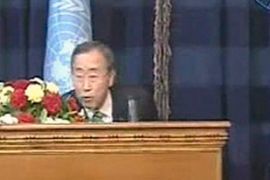UN set to expand role in Iraq
Draft resolution to extend its mandate looks likely to be approved next week.

Britain circulated the resolution to the other Security Council members on Wednesday and council experts went over the text. The experts were expected to meet again on Friday.
‘No problems’
Russia signalled its assent on Thursday, making approval by the Security Council almost certain.
Vitaly Churkin, Russia‘s UN ambassador, said on Thursday that “it’s overall a good draft … I don’t see any basic problems.”
The UN secretary-general has been under pressure from the US to expand the world body’s role in Iraq.
Ban Ki-moon said in June he would consider it, but said deteriorating security in Iraq was an obstacle.
The small UN Mission in Iraq has helped to organise elections, promote a national dialogue, and develop institutions for representative government. Its current mandate expires next Friday.
Mandate extension
The draft would extend the mission’s mandate for a year and authorise it to help organise reintegration programmes for former combatants, assist the return of refugees and displaced people, and promote economic reform and the development of an effective civil service and social services for the Iraqi people.
It would also be asked to promote human rights and judicial and legal reforms “in order to strengthen the rule of law” and to assist the government “on initial planning for a comprehensive census”.
Kofi Annan, the former secretary-general, pulled all UN international staff out of Iraq in October 2003 after a spate of attacks on humanitarian workers and two bombings at UN headquarters in Baghdad killed dozens, including the top UN envoy, Sergio Vieira de Mello.
In August 2004, Annan allowed a small U.N. contingent to return to Baghdad and imposed a ceiling of 35 international workers, which has steadily increased but remains relatively low because of the security situation.
Water shortages
The new mandate, if approved, would come as the situation in Iraq continues to deteriorate.
Besides daily violence, residents in Baghdad have had their taps run dry at the height of summer when temperatures are close to 50 degrees celsius.
Residents and city officials said on Thursday that large sections in the west of the capital had been virtually dry for six days because the already strained electricity grid could not provide sufficient power to run water purification and pumping stations.
The problem highlights the larger difficulties in a capital beset by violence, crumbling infrastructure, rampant crime and too little electricity to keep cool in the sweltering weather more than four years after the US-led invasion.